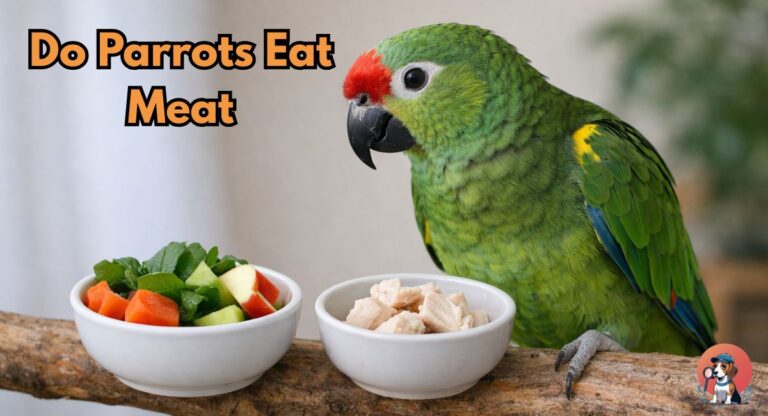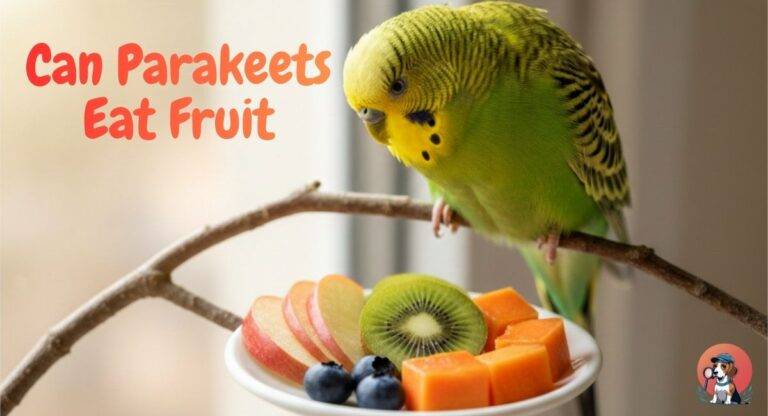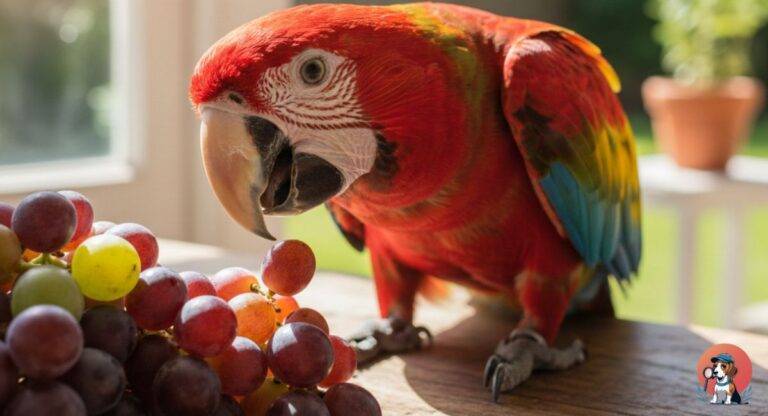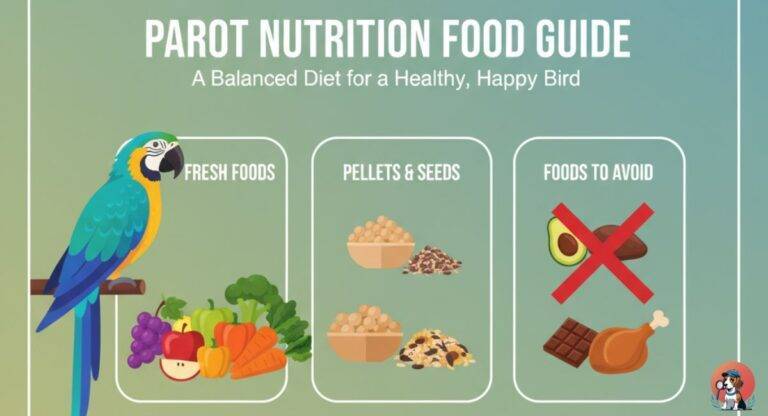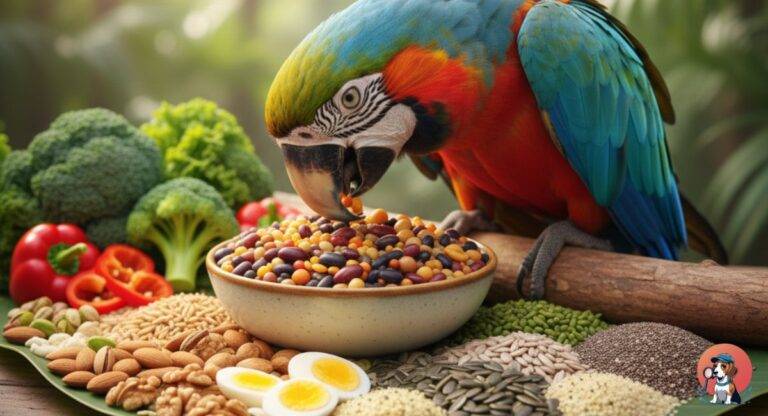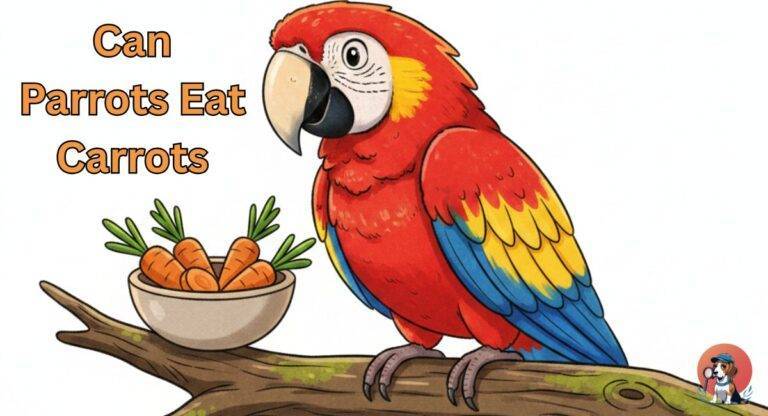How to Make Organic Parrot Food. Parrots are colorful, intelligent, and curious birds who thrive on a varied diet. Many owners ask, ‘What do parrots eat other than seeds and pellets?’ The nutritional plan is far more than the store-bought choices. How to Make Organic Parrot Food Can Improve Your Pet’s Energy and Health. It will also keep their feathers lustrous. Organic food is free of harmful chemicals and artificial additives, while also promoting a long life. You can also control the freshness, safety, and quality of your food by preparing it yourself.
How to Make Organic Parrot Food. Organic food is not just about feeding, it’s also about nurturing the overall health of your parrot. Fruits, vegetables, grains, and safe proteins should be included in a parrot’s daily diet. Each of these foods contains essential vitamins and minerals. Many owners wonder how to properly prepare these meals. How to Make Organic Parrot Food is easy and fun with the right guidance. Fresh ingredients are essential for immunity, digestion, and healthy feathers. You can help your what do parrots eat healthier by designing meals at home. How to Make Organic Parrot Food. Your parrot will also learn better behaviors through variety, enrichment, and bonding during feeding. It gives daily care a new meaning.
How to Make Organic Parrot Food will help you build a stronger relationship with your pet. Instead of relying solely on pre-packaged diets, you can create healthy meals that show your knowledge, love, and dedication. Healthy parrots reward this with vibrant colors, stronger immune systems, and a happier disposition. It is important to keep in mind that when thinking about what do parrots eat, balance is the key. Too much of a particular food can be harmful instead of beneficial. How to Make Organic Parrot Food, understanding safe choices, how to prepare them, and what you should avoid will help you build a system that is reliable and ensures the long-term health and happiness of your bird.
1. What ingredients should be used in organic parrot food?
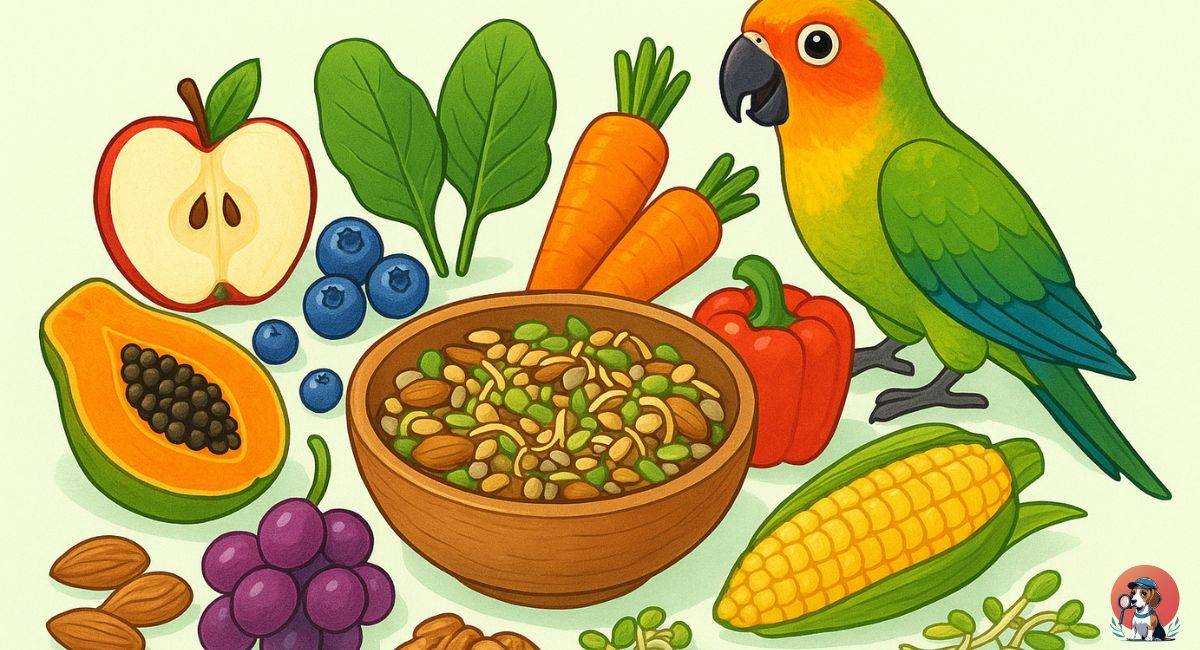 The first step to learning how To Make Organic Parrot Food is choosing the right ingredients. To stay active and healthy, parrots require a colorful mixture of grains, vegetables, and fruits. Each ingredient should be suitable for birds, fresh, and free of chemicals. Preservatives can be harmful to your health. Understanding what do parrots eat will help owners to provide a diet that is similar to a natural one. Include seeds, legumes, seasonal fruits, and leafy greens to provide essential vitamins and minerals. How to Make Organic Parrot Food. These ingredients, when chosen carefully, support feather health, growth, and immunity.
The first step to learning how To Make Organic Parrot Food is choosing the right ingredients. To stay active and healthy, parrots require a colorful mixture of grains, vegetables, and fruits. Each ingredient should be suitable for birds, fresh, and free of chemicals. Preservatives can be harmful to your health. Understanding what do parrots eat will help owners to provide a diet that is similar to a natural one. Include seeds, legumes, seasonal fruits, and leafy greens to provide essential vitamins and minerals. How to Make Organic Parrot Food. These ingredients, when chosen carefully, support feather health, growth, and immunity.
Fresh Vegetables
Vitamins and antioxidants are abundant in vegetables like carrots, spinach, broccoli, and other fresh produce. They boost immunity, improve bone health, and vision. Mixing leafy greens with colorful vegetables will ensure that your parrot gets a variety of nutrients. Chop them up into small pieces to make it easier for your parrot to eat and encourage regular consumption.
Seasonal Fruits
Apples, papaya, and berries are all natural sweeteners, rich in fiber and hydrating. These fruits are tasty and nutritious, while adding variety. Remove the seeds and pits of fruits like apples or cherries. Some contain toxins that are harmful to parrots. Small portions are best for balanced energy.
Whole Grains
Whole grains such as brown rice, quinoa, and oats provide fiber and energy that lasts for a long time. These foods are good for digestion, provide steady energy, and help prevent obesity. Parrots can safely eat grains that are prepared without the use of oil, butter, or seasoning. By combining grains and vegetables, you can create a balanced meal that will keep your parrot healthy.
Legumes
Beans, lentils, and chickpeas provide a good source of protein and fiber. To remove harmful compounds, cook them until they are soft and pliable. When combined with grains and vegetables, legumes promote muscle growth, energy, and feather quality. Also, they promote digestive health and are a great addition to parrot food.
Safe Proteins
The muscles and feathers need protein to grow. Boiling eggs or plain chicken cooked in a simple way can be served as a moderately-sized meal. Plant proteins are the most important, with animal protein being an occasional treat. These choices of safe proteins add variety and strength to the diet. They also ensure balanced nutrition for long-term health.
2. Parrots can safely eat fruits and vegetables
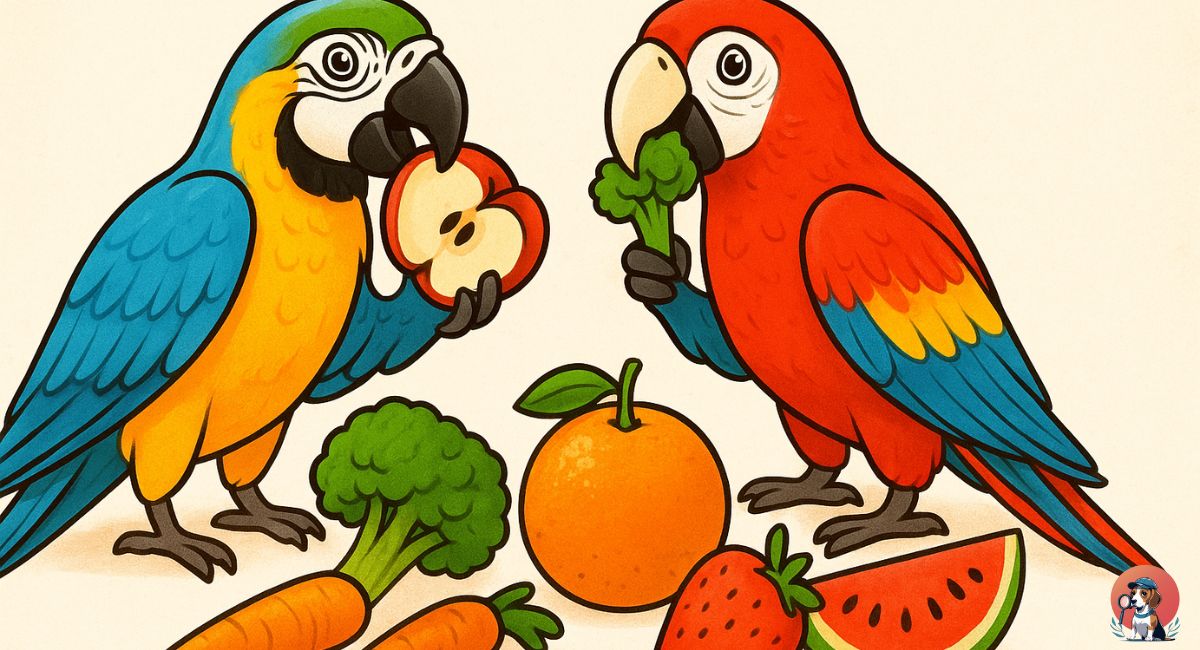 Knowing which fruits and vegetables are safe is a vital part of learning how to Make Organic Parrot Food. Leafy greens and root vegetables, as well as colorful fruits, are great for parrots. These foods are rich in vitamins, minerals, and antioxidants that improve immunity and feather quality. Owners ask What do parrots eat every day for their health? The answer is fresh produce, in small amounts, with a variety of fruits and vegetables. Avocados, for example, can be toxic. How to Make Organic Parrot Food. Seasonal produce is not only a great way to keep meals fresh, but it also helps parrots feel more at home and improves their mental health.
Knowing which fruits and vegetables are safe is a vital part of learning how to Make Organic Parrot Food. Leafy greens and root vegetables, as well as colorful fruits, are great for parrots. These foods are rich in vitamins, minerals, and antioxidants that improve immunity and feather quality. Owners ask What do parrots eat every day for their health? The answer is fresh produce, in small amounts, with a variety of fruits and vegetables. Avocados, for example, can be toxic. How to Make Organic Parrot Food. Seasonal produce is not only a great way to keep meals fresh, but it also helps parrots feel more at home and improves their mental health.
Leafy Greens
Leafy greens like spinach, kale, and romaine lettuce are rich in calcium, vitamin K, and antioxidants. These nutrients improve blood health and immunity while strengthening bones. By mixing greens with grains or fruit, parrots will accept them better.
Carrots
Beta-carotene is abundant in carrots, and it helps with feather pigmentation. Parrots can easily eat carrots if they are grated or lightly steamed. The crunchy texture of carrots also stimulates the beaks’ chewing instincts. Carrots are a great way to keep parrots’ vibrant colors and eyesight healthy throughout their lives.
Apples
Apples are a great source of hydration and fiber. They also have a natural sweetness. It is best to serve them in small pieces with the seeds removed. The seeds are toxic. Apples are a healthy treat that pairs well with grains and oats. The parrots enjoy the taste of apples, which is refreshing and contributes to digestive balance.
Berries
Blueberries, strawberries, and raspberries contain antioxidants, which are good for the heart and immune system. Parrots are attracted to their natural colors and sweetness. Fresh, washed berries can be offered a few times a week to add variety and protect against free radicals. This promotes long-term health.
Papaya
Papaya is rich in vitamins A, C, and digestive enzymes, which are beneficial for gut health. Parrots can easily digest it because it is soft and hydrating. Small papaya cubes help to improve digestion and nutrient absorption. This tropical fruit is a great addition to parrot meals. It keeps them healthy and happy with its natural flavor.
3. What to Include in Your Diet: Grains, legumes, and Protein
How To Make Organic Parrot Food contains grains, legumes, and proteins that are vital for the health of your parrot’s feathers and muscles. Balance is important for owners who ask What do parrots eat. Grains like quinoa and brown rice provide fiber and vitamins. Protein is found in legumes like lentils, beans, and boiled eggs. For safe digestion, all grains and legumes should be thoroughly cooked. These ingredients, when combined with fruits and vegetables, create meals that are nutrient-dense. How to Make Organic Parrot Food. Combining a variety of ingredients helps to prevent nutritional gaps and promotes long-term health in parrots.
Quinoa
Quinoa contains all the essential amino acids. It is light and gluten-free. Quinoa is delicious with fruits or vegetables, and it can be served plain. The soft texture and mild taste make quinoa a great option for parrots. It helps maintain their energy levels and overall body strength.
Brown Rice
Brown rice provides steady energy. It is richer in magnesium and fiber than white rice. This helps to support digestion and prevent blood sugar spikes. It is a balanced and filling meal when served plain, with vegetables. Brown rice keeps parrots energized and satisfied for longer.
Oats
Oats contain fiber and B vitamins, which are good for the heart and digestive system. Oats lightly cooked with fruit make a healthy breakfast for parrots. Slow-digesting carbohydrates give parrots sustained energy. Serve plain rolled oats with no additives. Flavored varieties can contain ingredients that are harmful to birds.
Lentils
Lentils contain iron, fiber, and protein. They promote stronger muscles and a better immune system. When lentils are boiled, they become soft and easy to eat. They pair well with grains and veggies. Regular lentil servings can improve feather quality, digestion, and overall health of a parrot.
Eggs Boiled
For feather strength, boiled eggs are a good source of calcium and protein. Serve them plain, in small portions, and without seasoning. Boiling eggs can sometimes provide a boost, even though plant proteins are the focus. When added to meals in moderation, this variety provides complete nutrition and energy.
4. What to avoid when feeding parrots?
When learning how to Make Organic Parrot Food, it is important to know which foods you should avoid. Some fruits, grains, and vegetables are healthy, while others may be toxic or harmful. Parrot owners are often searching What do parrots eat? “ to be safe. They must also be aware of harmful items like avocado, chocolate, and caffeine. These foods can be harmful in small quantities. It is also important to avoid fried, processed, and sugary foods. Owners can protect their parrots’ health by identifying and eliminating unhealthy foods. How to Make Organic Parrot Food. They also reduce the risk that they will be poisoned and can ensure all homemade meals are both nutritious and safe.
Avocado
Avocados contain persin, which is toxic to parrots. Even small amounts of avocado can cause respiratory problems, heart issues, and, in extreme cases, death. Avocados should never be fed in any form. Replace it with fruit that is safe for your parrot, such as papayas or apples.
Chocolate
Theobromine, caffeine, and chocolate are toxic to parrots. Hyperactivity, seizures, and heart failure can be caused by chocolate. Chocolate or cocoa should never be given to parrots. Offer naturally sweet alternatives, such as apple slices or berries, to satisfy your cravings and ensure safe nutrition.
Caffeine
Caffeine stimulates the nervous system and heart of a parrot. Coffee, tea, and energy drinks can be dangerous and shouldn’t be shared. Even small sips of coffee or tea can cause health complications. Fresh water and natural juices, in moderation, are a safer way to hydrate and provide energy.
Salty Foods
Salt can damage the parrot’s kidneys, and dehydration is a risk. Don’t give processed foods like chips, crackers, or salted nuts. In moderation, give plain or unsalted nuts and seeds. Maintaining low sodium levels promotes heart and kidney health, while also preventing electrolyte imbalances that can be dangerous to parrots.
Alcohol
Alcohol should not be consumed by parrots. Alcohol can cause death, as it depresses nerves, disorients, and causes the nervous system to be depressed. Even small amounts of alcohol can be harmful. Every day, fresh, clean water is the best and most healthy hydration option for parrots.
5. Prepare and store homemade parrot meals safely
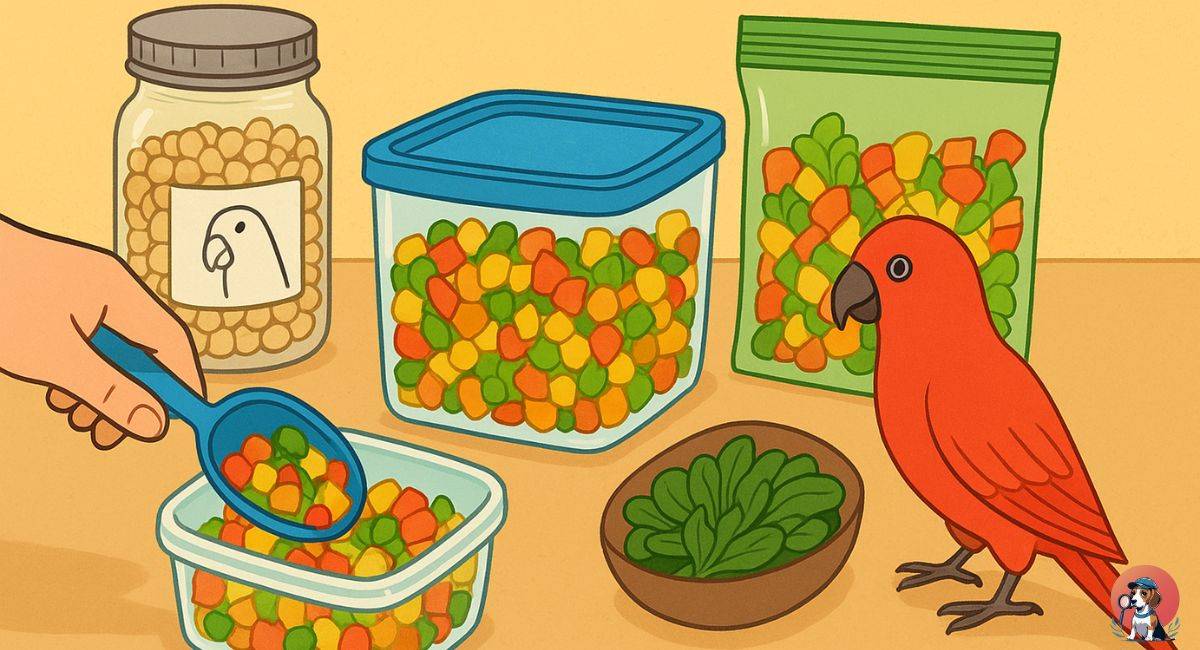 Food safety is as important as nutrition in the practice of How to Make Organic Parrot Food. When owners ask What do parrots eat, they must also consider storage and hygiene. To remove pesticides, all fruits and vegetables should be thoroughly washed. All grains and legumes should be cooked to perfection. Food should not be left in cages too long, as bacteria can develop. Store cooked portions in airtight containers for up to 2 days. How to Make Organic Parrot Food: By freezing in small batches, you can also prolong the freshness of your food. These practices keep meals clean, prevent illness, and ensure that your parrot enjoys healthy, safe food.
Food safety is as important as nutrition in the practice of How to Make Organic Parrot Food. When owners ask What do parrots eat, they must also consider storage and hygiene. To remove pesticides, all fruits and vegetables should be thoroughly washed. All grains and legumes should be cooked to perfection. Food should not be left in cages too long, as bacteria can develop. Store cooked portions in airtight containers for up to 2 days. How to Make Organic Parrot Food: By freezing in small batches, you can also prolong the freshness of your food. These practices keep meals clean, prevent illness, and ensure that your parrot enjoys healthy, safe food.
Washing Produce
Fresh produce can be cleaned thoroughly by washing it. This will remove dirt, bacteria, and pesticides. Before preparing vegetables and fruit, soak them in clean water. This reduces the exposure of harmful residues and makes food safer for parrots. Clean starts ensure that each meal is healthy and does not introduce hidden risks into the diet.
Cooking Grains
By cooking grains like quinoa, oats, and rice, you can make them more digestible, while also removing harmful compounds. Serve grains without any oil or seasoning. Cooking properly preserves nutrients and ensures safe consumption. The grains are also a good combination with the vegetables to create a balanced diet for parrots.
Refrigeration
Keep cooked food fresh and safe by refrigerating it. Keep portions in airtight plastic or glass containers that are free of BPA. You can store meals for up to 2 days. This ensures convenience and quality. Serve leftovers no later than this date, as bacterial growth can be harmful to the health of your parrot and its digestion.
Freezing Portions
The freezing of homemade parrot foods in large batches is an excellent way to preserve them. To reduce waste, divide meals into small containers and freezer bags. Thaw frozen portions in the fridge when needed. Freezing preserves food for a long time and allows owners to keep up with their feeding schedules.
Avoiding Contamination
When preparing parrot food, always use clean utensils and containers. Cross-contamination from raw food or dirty surfaces may introduce harmful bacteria. Kitchen hygiene is important for the health of your parrot, but it also helps to ensure that each meal is nutritious, safe, and enjoyable.
6. The Benefits of Organic Parrot Feeding
Owners how to Make Organic Parrot Food can often notice a dramatic improvement in the health of their pets. Understanding what do parrots eat leads to better care. Organic diets improve digestion and immunity. They also reduce the risk of illness due to chemicals found in processed food. Parrots will develop more energy and a longer lifespan as they age. Organic meals can also help prevent obesity and behavioral problems caused by unhealthy diets. Parrots are happier and healthier when they have fewer toxins. Organic food shows commitment and care. How to Make Organic Parrot Food, owners will be rewarded with birds who thrive, bond deeply, and live vibrant lives along with their families.
Stronger Immunity
Immunity is boosted by organic food that contains vitamins, minerals, and antioxidants. A stronger immune system can help parrots recover from illness and resist infection faster. Fresh fruits and vegetables, as well as clean proteins, provide the essential nutrition that is often missing in packaged diets. This helps parrots live longer, with fewer health problems.
Feather Quality Improved
Organic diets can contribute to a brighter color and softer texture. Vegetables, fruits, and grains provide nutrients that promote healthy, glossy feathers. Organic feeding reduces exposure to artificial chemicals and promotes healthy feather growth. This gives parrots an attractive, vibrant appearance.
Better Digestion
Fresh organic food is easier to digest than processed foods. Grains, beans, and leafy vegetables contain fiber, which regulates digestion and helps prevent constipation. Healthy digestion ensures that nutrients are absorbed efficiently, which keeps parrots balanced and energetic. This helps maintain a healthy weight and reduces the risk of diet-related problems.
Longer Lifespan
Organic diets can lead to healthier and longer-lived parrots. Balanced nutrition and reduced exposure to toxic substances reduce chronic illness. The reward for owners who feed their birds well is many more years with them.
Stronger Bonding
Prepare organic food at home to show commitment and care. This routine is recognized by parrots, and they respond with affection and trust. As parrots begin to associate positive experiences with you, feeding time becomes a bonding opportunity. This creates a more loving environment and strengthens the relationship between you and your parrot.
FAQs
1. How to Make Organic Parrot Food at home?
Make organic parrot food without additives or preservatives by mixing fruits, vegetables, and grains.
2. How to Make Organic Parrot Food with Grains?
To create a balanced meal for parrots, cook whole grains such as quinoa or rice and combine them with vegetables.
3. How to Make Organic Parrot Food as a Daily Diet?
Mix leafy greens with chopped fruits and soaked beans for a healthy, fresh diet.
4. How to Make Organic Parrot Food Easily?
Prepare quick and nutritious parrot food using seasonal produce, sprouted seed, and cooked beans.
5. How to Make Organic Parrot Food with Fruits?
Serve apples, bananas, berries, and seeds with greens and seeds for variety.
Conclusion
Understanding how to Make Organic Parrot Food allows owners to feed their birds a healthy and balanced diet. Parrots get complete nutrition by focusing on vegetables, fruits, and grains. What do parrots eat is no longer confusing because homemade meals provide clarity and control. A healthy diet is a long-term goal. Avoiding toxic food, preparing meals safely, and storing them properly are all ways to ensure this. Organic feeding promotes brighter feathers and stronger immunity. It also increases energy. How to Make Organic Parrot Food, owners who take the time to make fresh meals demonstrate care and dedication. This results in happier parrots, who are physically, emotionally, and behaviorally healthy.
How to Make Organic Parrot Food. Organic food for parrots has many benefits. The benefits of feeding organic meals to parrots are undeniable. Owners can also gain a deeper understanding of what do Parrots Eat in the Wild by learning how to Make Organic Parrot Food. They can then replicate a balanced diet that meets all nutritional needs. Positive responses include increased activity, vibrant colors, and improved moods. Feeding becomes more than a routine with consistency and love. How to Make Organic Parrot Food. It becomes a bonding activity. Over time, homemade organic foods prove to be an investment in the parrot’s long-term health.
Feeding organic food is ultimately a sign of love and responsibility. Fresh food prepared daily helps to build trust and connection with your parrot while also avoiding harmful chemicals. How to Make Organic Parrot Food is a great way for owners to take charge of their birds’ health and happiness. Caretakers can create meals that are healthy and enriching for both the body and mind by focusing on what do parrots eat. Organic is more than a diet. How to Make Organic Parrot Food. It’s a lifestyle that will bring your bird companion years of happiness, companionship, and vibrant health. A healthier diet will create a happier future for everyone.

